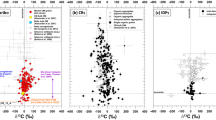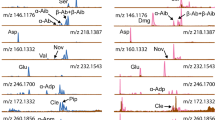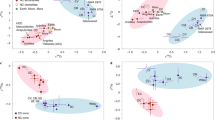Abstract
More than one thousand pieces of meteorites have been discovered recently in Antarctica1–4 which were preserved in the Antarctic Ice Sheet since their fall and were brought out on to the surface of the bare ice. They are likely to have the least possible terrestrial contamination, thus providing a new opportunity for the study of primordial organic synthesis in the early solar nebula5 and of chemical evolution before the emergence of life6,7. Organic compounds of extraterrestrial origin were first detected in the form of protein and non-protein amino acids with an equal abundance of their D- and L-enantiomers in the Murchison carbonaceous chondrite8,9. This ratio of enantiomers has been used as a criterion for the meteoritic origin of the amino acids detected subsequently in other meteorities10–13. We present here detailed evidence for the presence of amino acids of extraterrestrial origin in our Antarctic carbonaceous chondrite14.
This is a preview of subscription content, access via your institution
Access options
Subscribe to this journal
Receive 51 print issues and online access
$199.00 per year
only $3.90 per issue
Buy this article
- Purchase on Springer Link
- Instant access to full article PDF
Prices may be subject to local taxes which are calculated during checkout
Similar content being viewed by others
References
Yoshida, M., Ando, H., Omoto, K., Naruse, R. & Ageta, Y. Nankyoku Shiryo (Antarctic Rec.) 39, 62–65 (1971).
Cassidy, W. A., Olsen, E. & Yanai, K. Science 198, 727–731 (1977).
Yanai, K. Mem. natn. Inst. Polar Res. Spec. Issue 8, 1–37 (1978).
Yanai, K. Mem. natn. Inst. Polar Res. Spec. Issue 8, 51–69 (1978).
Anders, E., Hayatsu, R. & Studier, M. H. Science 182, 781–790 (1973).
Ponnamperuma, C. The Origins of Life, 215 (Thames and Hudson, 1972).
Miller, S. L. & Orgel, L. E. The Origins of Life on the Earth, 229 (Prentice-Hall, New Jersey, 1974).
Kvenvolden, K. et al. Nature 228, 923–926 (1970).
Kvenvolden, K. A., Lawless, J. G. & Ponnamperuma, C. Proc. natn. Acad. Sci. U.S.A. 63, 486–490 (1971).
Oró, J., Gibert, J., Lichtenstein, H., Wikstrom, S. & Flory, D. A. Nature 230, 105–106 (1971).
Cronin, J. R. & Moore, C. B. Science 172, 1327–1329 (1971).
Lawless, J. G., Kvenvolden, K. A., Peterson, E., Ponnamperuma, C. & Moore, C. Science 173, 626–627 (1971).
Lawless, J. G., Kvenvolden, K. A., Peterson, E., Ponnamperuma, C. & Jarosewich, E. Nature 236, 66–67 (1972).
Yanai, K. & Haramura, H. Mem. natn. Inst. Polar Res. Spec. Issue 8, 264–267 (1978).
Buhl, P. H. thesis, Univ. Maryland (1975).
Kotra, R. K., Shimoyama, A., Ponnamperuma, C. & Hare, P. E. J. molec. Evolut. (in the press).
Author information
Authors and Affiliations
Rights and permissions
About this article
Cite this article
Shimoyama, A., Ponnamperuma, C. & Yanai, K. Amino acids in the Yamato carbonaceous chondrite from Antarctica. Nature 282, 394–396 (1979). https://doi.org/10.1038/282394a0
Received:
Accepted:
Issue Date:
DOI: https://doi.org/10.1038/282394a0
Comments
By submitting a comment you agree to abide by our Terms and Community Guidelines. If you find something abusive or that does not comply with our terms or guidelines please flag it as inappropriate.



